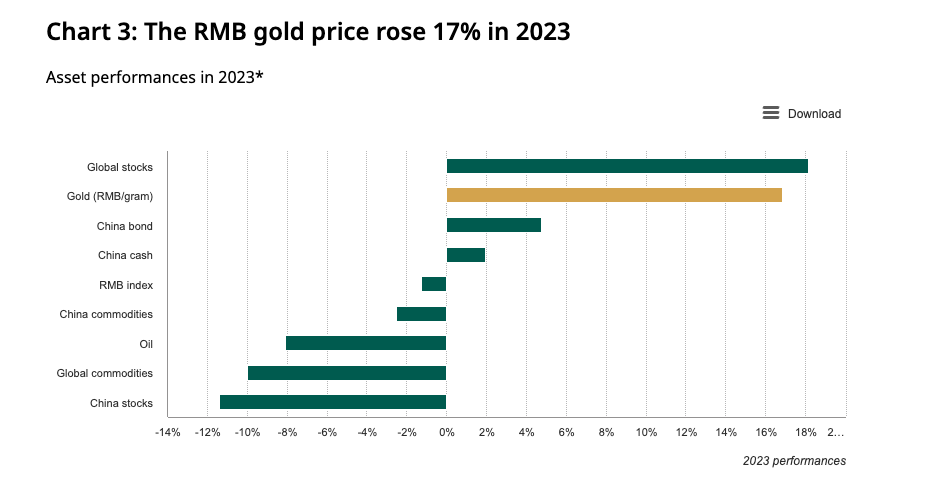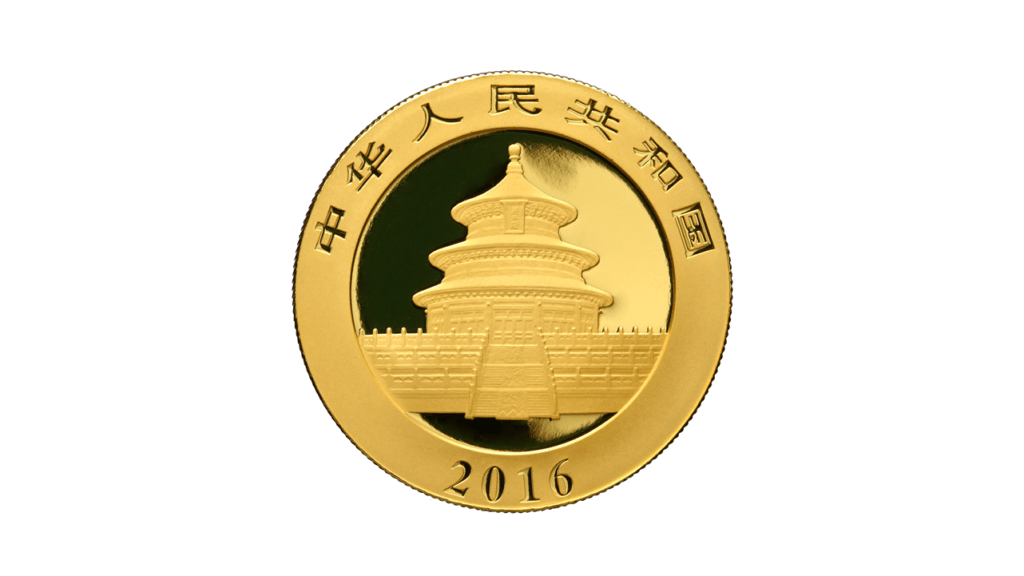Chinese gold demand improved in 2023 even as the price in yuan soared.
China ranks as the world’s biggest gold market, and Chinese demand has a significant impact on the global gold market.
Gold charted a 17 percent increase in yuan terms and was the second-best-performing asset class in China. Only global stocks outperformed gold in renminbi terms.

Gold was up 14 percent in dollar terms in 2023.
According to the World Gold Council, “geopolitical risks, sizable central bank purchases – and intensifying expectations of major central banks lowering rates” supported gold in 2023.
Even with rising prices, wholesale gold demand was up in 2023.
Gold withdrawals from the Shanghai Gold Exchange (SGE) totaled 1,687 tons in 2023, a 7 percent year-on-year increase. Wholesale demand was 3 percent above the 5-year average.
According to the World Gold Council, gold’s “eye-catching performance and strong local and global central bank purchases led to extensive coverage by local media.”
And gold’s attractiveness was further boosted by the increasing need of households to preserve value: the local gold price’s outstanding performance drew their attention when the currency other major assets weakened.
The WGC said innovations by jewelry manufactures and expanding product ranges that adapted to evolving consumer preferences also boosted gold’s appeal.
China Daily reported a 12.2 percent increase in gold and silver jewelry sales through the first three quarters of 2023. According to the president of the Gems & Jewelry Trade Association of China, the jewelry sales nearly doubled growth in the overall retail sector.
According to China Daily, jewelry exports recovered to pre-pandemic levels, with the total value reaching about 66.7 billion in 2022. That represents an 18 percent increase compared to 2019. The overall export value of jewelry from January to June 2023 came in at 39.4 billion yuan, a 13.3 percent increase over the same period last year.
This growth in Chinese gold demand happened despite some economic headwinds. As the World Gold Council put it, “China’s economic recovery in 2023 was not a smooth sail and consumers remained cautious in spending.”
COVID-related restrictions were dropped at the end of 2022, a notable rebound in consumer spending and the return to normalcy in all industries fueled China’s growth in early 2023. But the momentum didn’t last, as Q2 and Q3’s growth failed to meet market expectations. The sentiment improved mildly in Q4, pushing 2023’s annual GDP growth to 5.2 percent, above the 5 percent target set by policymakers.
Gold demand wasn't just a function of jewelry sales. Chinese investors were keenly interested in the yellow metal in 2023 as well.
Chinese demand for gold bars and gold coins came in at 82 tons in the third quarter alone. It was a 16 percent increase year-on-year and the strongest Q3 Chinese gold investment demand since 2018. It was also above both the five-year and 10-year third-quarter averages.
Through the first nine months of 2023, investment gold demand was up 26 percent compared to 2022.
Chinese gold-backed ETFs led global inflows last year, adding 10 tons to their holdings. That drove Chinese gold ETF holdings to 61.5 tons with total assets under management reaching 29 billion yuan ($4 billion).
Strong demand coupled with a decline in gold imports led to a significant price premium in China last year.
The Shanghai-London gold price premium reached an annual average of 1.5 percent ($29 per ounce). It was the highest premium in history. The daily premium record was set on Sept. 14, when the local gold price premium reached $121 per ounce. (6.4 percent).
Chinese central bank gold buying also helped boost the local gold market and helped drive another strong year of central bank demand globally.
The People’s Bank of China began reporting gold purchases again in November 2022 after over a year of silence. Since then, the central bank has announced increases in its gold reserves every single month.
In 2023, the People’s Bank of China officially increased its gold holding by 225 tons. That pushed its official reserves to 2,235 tons as of the end of December. Gold now accounts for 4.3 percent of China’s official foreign exchange reserves.
There has long been speculation that China owns far more gold than it officially reveals. As Jim Rickards pointed out on Mises Daily back in 2015, many analysts believe that China keeps several thousand tons of gold “off the books” in a separate entity called the State Administration for Foreign Exchange (SAFE).

About the Author:
Mike Maharrey is a journalist and market analyst for MoneyMetals.com with over a decade of experience in precious metals. He holds a BS in accounting from the University of Kentucky and a BA in journalism from the University of South Florida.





